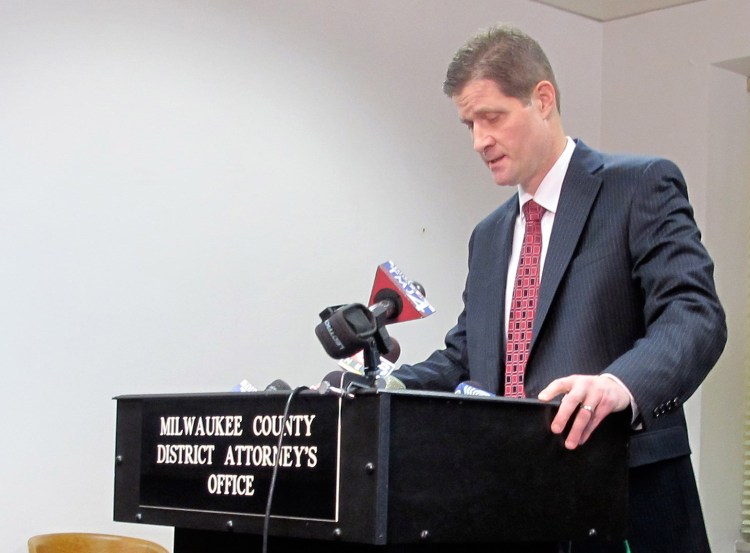How would you feel about living in a country where prosecutors could create a totally fictional offense to harass innocent people with whom they had a political disagreement?
And what if they ordered the police to use warrants signed by sympathetic judges to break down those people’s doors, haul them out, terrorize their families and ransack their private property, confiscating their phones, computers and financial records?
Finally, what if those officials topped off their perfidy by ordering their victims, under penalty of law, not to discuss these assaults with anyone – not their relatives, not their friends, not their neighbors and not the media – and then gagged their lawyers as well?
That would be a terrible place to live, you say? Almost a dictatorship?
Well, you live in that country.
The hundreds of subjects of two investigations under Wisconsin’s “John Doe” law – which hides the names of its targets (hence its name) and mandates silence from those being investigated – were all conservatives.
As National Review’s Rich Lowry wrote April 21, Gov. Scott Walker’s opponents “weaponized” campaign finance laws to target Walker during his first campaign, when $11,272 was embezzled from a veterans’ group that he supported.
That fizzled after the embezzler was caught, but prosecutors later returned to the well with the help of a compliant judge to brutalize citizens who supported Walker’s reforms during his first term as governor.
Lowry noted, “As Scott Walker’s first campaign for governor got underway in 2010, the Milwaukee district attorney, John Chisholm, opened the initial John Doe investigation … . A partisan Democrat whose wife was a shop steward for a teachers’ union, Chisholm investigated everything possible related to Walker for a couple of years, without really laying a glove on him.”
But when Walker ran for re-election, Chisholm and Special Prosecutor Francis Schmitz tried again, this time focusing on people like Cindy Archer, who was an architect of Act 10, a law that reformed public-union collective bargaining rules and reined in tax-financed pensions that were running huge deficits.
“(The police) came with a battering ram,” said Archer, who was undressed when the first blows hit her door. She was forced to run in full view of officers in order to clothe herself, she told National Review’s David French in a May 4 report on three separate John Doe raids. The account was headlined with a quote from one of the other targets: “I thought it was a home invasion.”
Those affected could not publicly defend themselves, and suffered continuing damage to their businesses and reputations as the story was leaked to the media.
But when the case reached the courts, and was publicized by activist Eric O’Keefe of the pro-small government Wisconsin Club for Growth, who courageously stood up to the gag order to tell The Wall Street Journal the story, those who had suffered years of economic loss and political persecution finally found relief.
As Jacob Sullum, senior editor at the libertarian magazine Reason, wrote July 22, “The Wisconsin investigation … eventually encompassed ‘all or nearly all right-of-center groups and individuals in Wisconsin who engaged in issue advocacy from 2010 to the present,’ as U.S. District Judge Rudolph Randa explained in a 2014 ruling. The targets, which included 29 conservative organizations, were suspected of coordinating their activities with Gov. Scott Walker. … (But) there was little evidence of such coordination, which in any event was not a crime.”
That’s right. There was no criminal activity whatsoever, because speech about issues is entirely legal, and becomes criminal only if there is coordinated “express advocacy” for or against a specific candidate.
When the case was returned to the Wisconsin Supreme Court, it ruled July 16 that the charges were “unconstitutional,” saying they were “unsupported in either reason or law.”
Justice Michael Gableman added, “It is fortunate, indeed, for every other citizen of this great State who is interested in the protection of fundamental liberties that the special prosecutor chose as his targets innocent citizens who had both the will and the means to fight the unlimited resources of an unjust prosecution.”
But, as Kurt Bauer, head of a targeted group, Wisconsin Manufacturers and Commerce, told the Journal, “I think part of the goal all along was to chill our fundraising and keep us off the airwaves. So the money and time we had to spend defending ourselves was money and time that we couldn’t spend toward issue advocacy.”
And, since the Journal noted July 17 that “President Obama’s Justice Department recently said it will ‘aggressively pursue’ coordination prosecutions,” this may only be the beginning.
Considering how the Internal Revenue Service was used to tie up dozens of conservative issue-advocacy groups’ applications over the entire 2012 campaign season, and has never been held accountable for that effort, it might even work the next time, too.
M.D. Harmon, a retired journalist and military officer, is a freelance writer and speaker. He can be contacted at:
mdharmoncol@yahoo.com
Send questions/comments to the editors.



Success. Please wait for the page to reload. If the page does not reload within 5 seconds, please refresh the page.
Enter your email and password to access comments.
Hi, to comment on stories you must . This profile is in addition to your subscription and website login.
Already have a commenting profile? .
Invalid username/password.
Please check your email to confirm and complete your registration.
Only subscribers are eligible to post comments. Please subscribe or login first for digital access. Here’s why.
Use the form below to reset your password. When you've submitted your account email, we will send an email with a reset code.